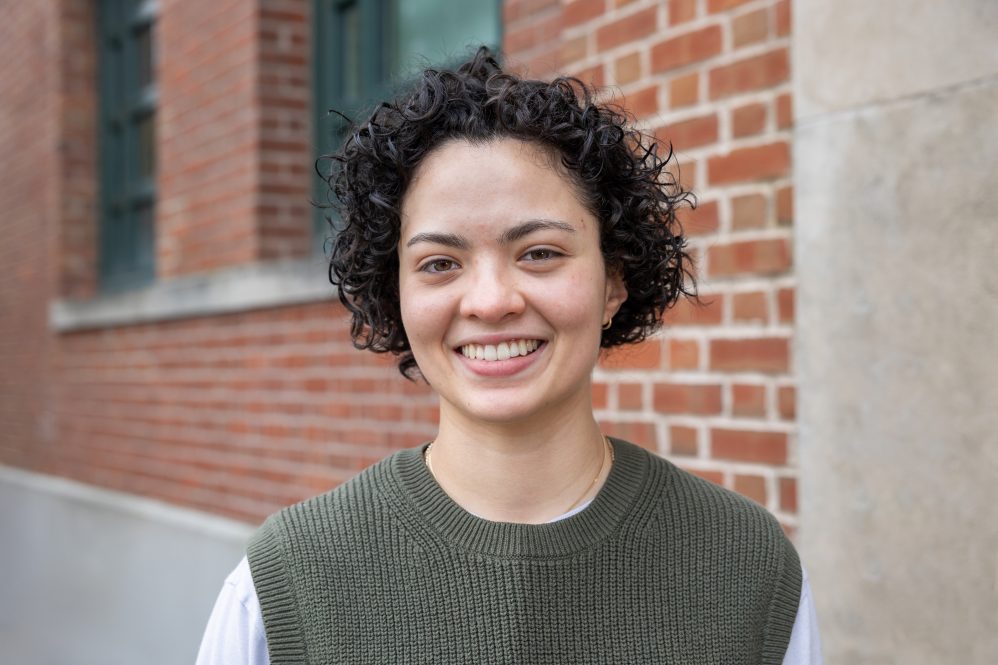Beekeeping and kickboxing might seem like two interests at opposite extremes from each other, but they both suit Gabriela Fonseca just fine, having picked both of them up at a UConn involvement fair. Getting involved was a hallmark of Gabriela’s time at UConn, with multiple internships giving her hands-on experience in her field. That experience will serve her well in whatever comes next, along with the connections she built with peers and professors, and the shared memories they forged.
Why did you choose UConn?
I originally came to UConn looking for an animal science degree, and even though I switched, I picked UConn because of the quality of the University’s educational programs, and the opportunities networking with the professors at a research institution would open for me. The space also feels like home. When I toured UConn for the first time in Spring 2019, I fell in love with the campus’s beauty and small feel. It is a relatively big campus with a significant student population, but the sense of community and school spirit is strong and welcoming.
What’s your major or field of study, and what drew you to it?
I’m majoring in Natural Resources and the Environment with a concentration in Fisheries and Wildlife Management. I chose this major because I always wanted to work with wildlife. I have always been passionate about learning and researching to restore ecosystems and allow local wildlife to thrive despite anthropogenic effects.
Did you have a favorite professor or class?
Morty Ortega was my favorite. He was friendly, funny, and kind enough to sit with me for as many hours as I needed to answer all of my questions on what I should expect in the world of wildlife biology, how to land my first internship, and general guidance for my academic and professional career. Morty helped me get through many of the hurdles that come with the anxiety of applying to an internship or a job by walking me through the aspects of the application that needed most of my attention and making sure all my documents were up to par. My favorite class was Population Dynamics with Dr. T Rittenhouse. I have always struggled with math courses, but Dr. T’s approach helped me understand the formulas and inspired me to propose creating a population model during my internship at Oikonos Knowledge Ecosystem.
What activities were you involved in as a student?
I was mainly involved with the beekeeping club on campus. We keep our bees at SVSF to ensure better pollination of their crops. Still, we also delve into the realm of educating about native bee species and the importance of pollinator diversity in recreational and farming spaces.
What’s one thing that surprised you about UConn?
The sheer amount of activities to take part in! UConn has a lot of clubs and organizations that are educational and/or fun! It allows us to try different things. Thanks to the involvement fair, I discovered my interest in beekeeping and kickboxing and met people who became some of my closest friends.
What are your plans after graduation/receiving your degree?
Currently, I am focusing on finding seasonal jobs to get more field experience. Once I identify a Master’s program or a long-term position that aligns with my desire to conduct research and manage land, I will apply, hopefully crossing over to the next chapter in my professional life.
How has UConn prepared you for the next chapter in life?
UConn’s Natural Resource and the Environment program is known for being very hands-on. Throughout my academic career, I have been lucky enough to assist multiple internships, and supervisors always told me I stood out thanks to my knowledge and comfort practicing different field tasks, which allowed them to teach me new and more complex data collection methods. If the courses here weren’t structured in the hands-on way they are, I wouldn’t have been able to take such good advantage of my opportunities.
Any advice for incoming students?
Definitely get out there and talk to professors about what you think you are interested in doing after you graduate, even if you don’t have a clear idea of your desired job. You may meet a professor who is more than willing to guide you down a path that fits your goals. The guidance of a good professor is sometimes worth more than anything you can learn in class.
What’s one thing everyone should do during their time at UConn?
As a rite of passage, every CAHNR student should take most of their classes at Young 336 and prefer that hall over all the other lecture halls at the Young building. Going to the dairy bar after class on a snowy day is also a must!
What will always make you think of UConn?
If there are two things I always think of when I think about UConn, they are beautiful skies and strong winds. The view atop Horsebarn Hill is unlike any other, especially during sunrise; coming from someone who doesn’t like to be up early when it is cold, sipping some hot coffee while waiting for the sun to come up is quite magical. On the other hand, the wind chills me to the bone and is the one thing I don’t love.



